|
|
|
Sort Order |
|
|
|
Items / Page
|
|
|
|
|
|
|
| Srl | Item |
| 1 |
ID:
068787
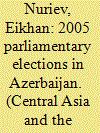

|
|
|
| 2 |
ID:
145637
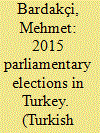

|
|
|
|
|
| Summary/Abstract |
Turkey held two consecutive parliamentary elections in an interval of five months that produced entirely different results. The June 7 elections saw the Adalet ve Kalkınma Partisi (AKP) lose its parliamentary majority and the rise of the Halkların Demokratik Partisi (HDP) as a game-changer. Following the collapse of coalition talks, the subsequent snap elections held on November 1, 2015 took place under a dramatically different context, being marked with issues of security and stability that trumped the issues that were decisive in the June 7 elections, such as the economic slowdown, growing authoritarianism, and allegations of corruption. The electorate's search for a stable and strong government, the AKP's adjustments in an apparent response to the criticisms of the electorate, and the mistakes made by opposition parties gave the AKP the opportunity once again to form a single-party government after the November 1 elections.
|
|
|
|
|
|
|
|
|
|
|
|
|
|
|
|
| 3 |
ID:
161073
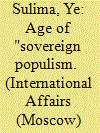

|
|
|
|
|
| Summary/Abstract |
ON FEBRUARY 13, 2018, Stefano Feltri, well-known in his country as a political analyst and deputy director of Il Fatto Quotidiano daily, published his new book Populismo sovrano.1 He has written that populism revived in Europe and outside it is rooted in the current demand for sovereignty, concerns over the negative effects of globalization and the crumbling of the West that for a fairly long period of postwar social contract based on integration that guaranteed peace and prosperity remained responsible for sustainable development. The crisis of political discourse caused by the shop-soiled ideas and programs of the traditional mainstream parties, which offered no adequate answers to the new challenges of contemporary globalism, rekindled populism in the West. This crisis provoked a deep-seated mistrust in the party system, parliamentarianism, political elites, and international institutions that in the eyes of the common people look not amenable to any reform. People have no faith not only in the results of the procedures of representative democracy, but in these procedures themselves up to and including the mechanism of delegated responsibility and the importance of compromises between different political positions.
|
|
|
|
|
|
|
|
|
|
|
|
|
|
|
|
| 4 |
ID:
129214
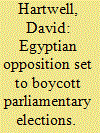

|
|
|
| 5 |
ID:
161854
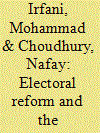

|
|
|
|
|
| Publication |
Kabul, AISS, 2018.
|
| Description |
x, 114p.pbk
|
| Series |
Political System Reform Studies III
|
| Standard Number |
9789936807006
|
|
|
|
|
|
|
|
|
|
|
|
Copies: C:1/I:0,R:0,Q:0
Circulation
| Accession# | Call# | Current Location | Status | Policy | Location |
| 059537 | 324.630581/IRF 059537 | Main | On Shelf | General | |
|
|
|
|
| 6 |
ID:
138425
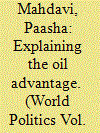

|
|
|
|
|
| Summary/Abstract |
Why does natural resource wealth prolong incumbency? Using evidence from parliamentary elections in the Islamic Republic of Iran, the author shows that natural resource revenues boost incumbent reelection rates because they are used to provide public or private goods to constituents, which incentivizes voters to reelect incumbents over challengers. To test this hypothesis, the author employs originally assembled data on five parliamentary elections in Iran (1992–2008) in longitudinal hierarchical regression analyses at the district and province levels. By leveraging Iran's mixed-member electoral system, he shows that the resource-incumbency mechanism works primarily in single-member districts with little evidence of an incumbency advantage for politicians in resource-rich multimember districts. Building on the rentier theory of natural resource wealth, the results suggest that voting for the incumbent is attributable to patronage and public goods distribution. The findings offer new insights into the understudied context of Iranian legislative elections, illustrate the mechanisms driving the relationship between resource wealth and incumbency advantage at the subnational level in a nondemocratic setting, and highlight the mediating effects of electoral institutions on the resource-incumbency relationship.
|
|
|
|
|
|
|
|
|
|
|
|
|
|
|
|
| 7 |
ID:
191033


|
|
|
|
|
| Summary/Abstract |
AS COULD be expected, discussions of a higher retirement age that began in France in 2023 stirred up wide-scale protests across the country. After several failed attempts to draw the National Assembly, the lower house of the French parliament, to her side, Prime Minister Elisabeth Borne, supported by President Emmanuel Macron, had no choice but to rely on Article 49.3 of the Constitution of France and sign the pension reform into law in circumvention of parliament...
|
|
|
|
|
|
|
|
|
|
|
|
|
|
|
|
| 8 |
ID:
089669
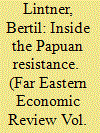

|
|
|
|
|
| Publication |
2009.
|
| Summary/Abstract |
The Indonesian election on July 8 seems likely to give Susilo Bambang Yudhoyono another five years in office. He is ahead of other candidates in opinion polls, and his Democratic Party emerged as the country's largest in the parliamentary elections in April. A high degree of normality and stability has returned to Indonesia after years of political and social turmoil. Only a decade ago, many feared that Indonesia would break up along ethnic lines and become a "Southeast Asian Yugoslavia.
|
|
|
|
|
|
|
|
|
|
|
|
|
|
|
|
| 9 |
ID:
157255


|
|
|
|
|
| Summary/Abstract |
PARLIAMENTARY ELECTIONS on September 24 were a sad experience for Germany's political heavyweights, the Christian Democratic Union (CDU) and the Social Democratic Party (SPD). Each of them suffered the heaviest defeat in its history, CDU mustering just 32.9% and the SPD 20.5% of votes.1 Angela Merkel lost 8% and Martin Schulz 5% of their regular voters. The Christian Democrats hadn't done so badly since 1949, and the Social Democrats got fewer votes than they had during the reign of Kaiser Wilhelm in 1913. According to a survey, more than 60% of Germans said that they couldn't understand why they needed the SPD at all because there was no difference between its platform and the postulates of the CDU.
|
|
|
|
|
|
|
|
|
|
|
|
|
|
|
|
| 10 |
ID:
126845
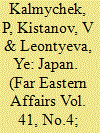

|
|
|
|
|
| Publication |
2013.
|
| Summary/Abstract |
The unstable situation in Japan's internal politics continued in 2012 and early 2013. Having come to power at the end of 2009, the Democratic Party was unable to keep its campaign promises and thus suffered defeat in the December 2012 parliamentary elections. The Liberal Democratic Party, once again in power, is also encountering a number of serious challenges in domestic and foreign politics. Prime Minister Shinzo Abe intends to bring the economy out of its prolonged stagnation, and to conduct a firm international policy that includes resolving territorial disputes with neighboring countries.
|
|
|
|
|
|
|
|
|
|
|
|
|
|
|
|
| 11 |
ID:
160647
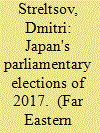

|
|
|
|
|
| Summary/Abstract |
This article analyzes extraordinary elections to Japan's House of Representatives held on October 22, 2017. The author notes that the voters showed little interest in the elections, but the sense of a foreign threat associated with the actions of North Korea, along with the lack of a real alternative to the Liberal Democratic party, and the chaos in the ranks of the opposition, allowed the parties of the rightist coalition to win a resounding victory and keep their qualified majority in the lower house of parliament.
|
|
|
|
|
|
|
|
|
|
|
|
|
|
|
|
| 12 |
ID:
133961


|
|
|
|
|
| Publication |
2014.
|
| Summary/Abstract |
Using the Finnish National Election Study, this article examines whether one's opinion about immigration is related to the factual knowledge one has about it. Opinion is measured both in terms of a general attitude toward immigration and attitude toward work-related immigration. Contrary to what was expected, low issue saliency and high knowledge about immigration combined to predict pro-immigration attitudes. Additionally, low knowledge about immigration interacted with a disadvantaged labor-market position to predict anti-immigration attitudes. The impact of issue-specific knowledge on opinion seems to come mostly through interactions with other, conditioning, variables. The implications of these findings are discussed.
|
|
|
|
|
|
|
|
|
|
|
|
|
|
|
|
| 13 |
ID:
125000


|
|
|
|
|
| Publication |
2013.
|
| Summary/Abstract |
This work examines the results from the latest off-year parliamentary elections in Japan. The main provisions of the political parties' campaign platforms are presented, and the reasons for the Democratic Party's crushing defeat and the victory of the Liberal Democratic Party are analyzed in detail.
|
|
|
|
|
|
|
|
|
|
|
|
|
|
|
|
| 14 |
ID:
086686
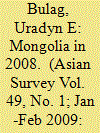

|
|
|
|
|
| Publication |
2009.
|
| Summary/Abstract |
In 2008 Mongolia witnessed the first violent riots in the wake of parliamentary elections since the country became a democracy in 1992, but the crisis was mitigated by the formation of a coalition government. Mining has become a key factor for defining Mongolia's domestic politics and international relations.
|
|
|
|
|
|
|
|
|
|
|
|
|
|
|
|
| 15 |
ID:
130206


|
|
|
|
|
| Publication |
2014.
|
| Summary/Abstract |
The political stalemate prevailing in Nepal since the dissolution of the first Constituent Assembly (CA) in 2012 ended with the second CA polls in November. Bhutan's second parliamentary elections in July and the opposition People's Democratic Party's victory over the outgoing Druk Phuensum Tshogpa (Bhutan Peace and Prosperity Party) were signs of consolidation of Bhutan's nascent democracy.
|
|
|
|
|
|
|
|
|
|
|
|
|
|
|
|
| 16 |
ID:
162984
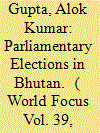

|
|
|
|
|
| Summary/Abstract |
Most newspapers and websites have commended the improvement which could be made possible owing to procedural reforms introduced by the Election Commission of Bhutan. It has been able to reignite the voter interest and arrest the further decline in voter turnout as the improvement in the election of National Council was repeated once again in the elections of National Assembly in 2018.
|
|
|
|
|
|
|
|
|
|
|
|
|
|
|
|
| 17 |
ID:
192465
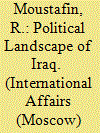

|
|
|
|
|
| Summary/Abstract |
IRAQ has entered a very complicated period of its history: a change of ideologies, the collapse of previous state structures, and the emergence of new forms of government. The 20-year American occupation turned the country's political landscape upside down. Today in Iraq there are multiple views on the country's future development, about where to go next: Should the country move toward the Arab world and Iran or try to rebuild the collapsed bridges with the West? Should it remain a secular state or rely on orthodox Islam? China is gaining weight in the region, yet the main element of suspense in Iraq's political life is the emergence of serious disagreements, if not a split, between the Shia parties and groups in the country, where Shia Muslims constitute a clear but not overwhelming majority of the population.
|
|
|
|
|
|
|
|
|
|
|
|
|
|
|
|
| 18 |
ID:
129981
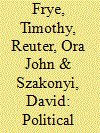

|
|
|
|
|
| Publication |
2014.
|
| Summary/Abstract |
The authors explore how modern autocrats win elections by inducing employers to mobilize their employees to vote for the regime and thereby subvert the electoral process. using two original surveys of employers and workers conducted around the 2011 parliamentary elections in russia, they find that just under one-quarter of employers engaged in some form of political mobilization. they then develop a simple framework for identifying which firms engage in voter mobilization and which workers are targeted for mobilization. firms that are vulnerable to state pressure-financially dependent firms and those in sectors characterized by asset immobility-are among the most common sites of workplace-based electoral subversion. the authors also find that workers who are especially dependent on their employer are more likely to be targeted for mobilization. By identifying the conditions under which workplace mobilization occurs in authoritarian regimes, the authors contribute to the long-standing debate about the economic bases of democratization. in addition, they explore an understudied means of subverting elections in contemporary autocracies: the use of economic coercion to mobilize voters. Moreover, their research finds that clientelist exchange can thrive in industrial settings and in the absence of deeply embedded political parties.
|
|
|
|
|
|
|
|
|
|
|
|
|
|
|
|
| 19 |
ID:
060452
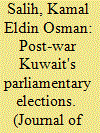

|
|
|
| 20 |
ID:
125022
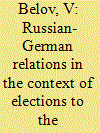

|
|
|
|
|
| Publication |
2013.
|
| Summary/Abstract |
IN 2013, special attention is focused on the state and prospects of the whole complex of relations between Russia and Germany: parliamentary elections in Germany, scheduled for September 22, 2013, will usher in a new four-year period of our cooperation. Naturally, such a division into periods is formal and is associated with a possible change of government in Germany. It is very likely that the upcoming elections will result in a new government, which will determine the main parameters of Germany's foreign policy, including its policy towards Russia.
|
|
|
|
|
|
|
|
|
|
|
|
|
|
|
|
|
|
|
|
|